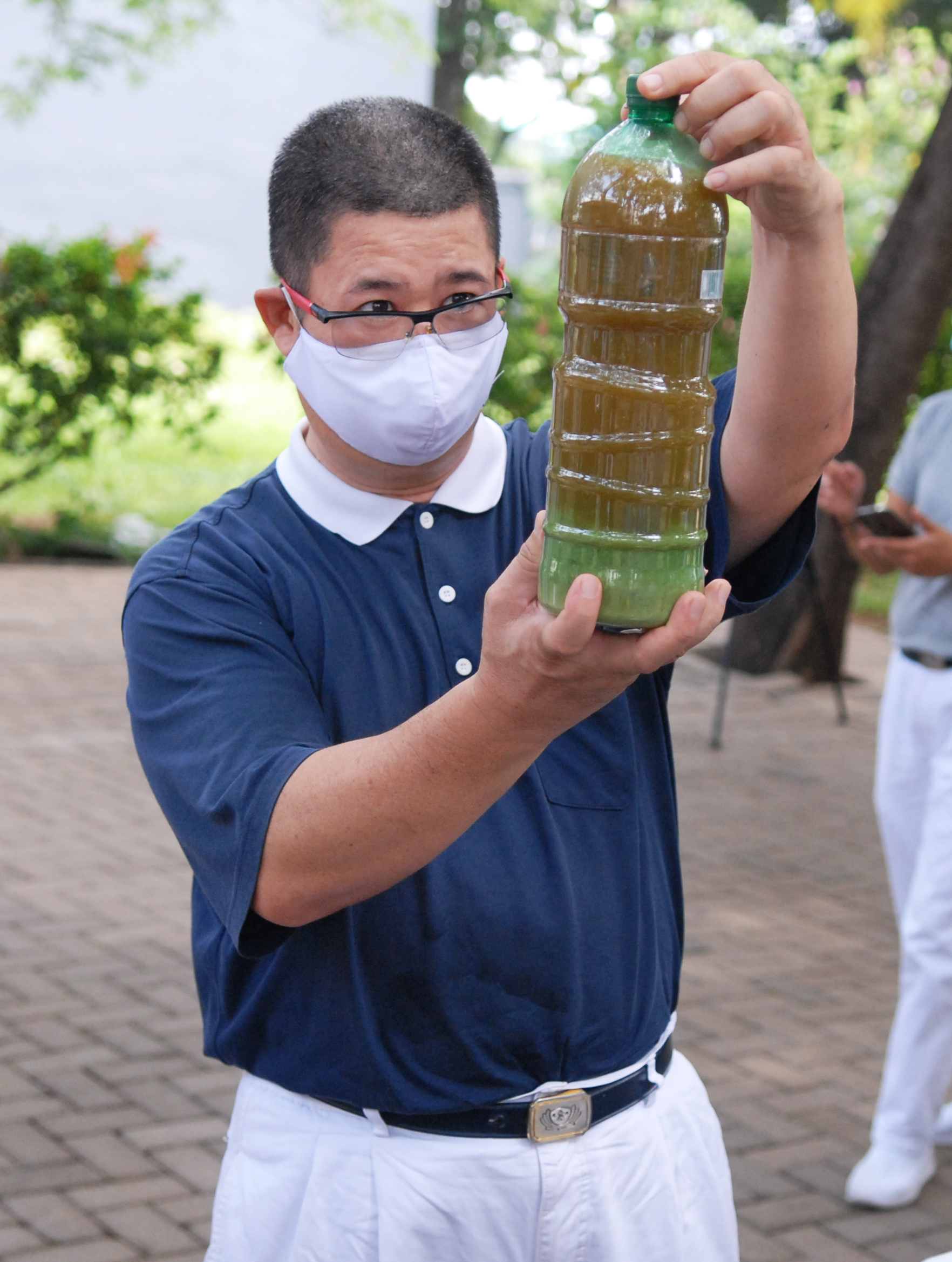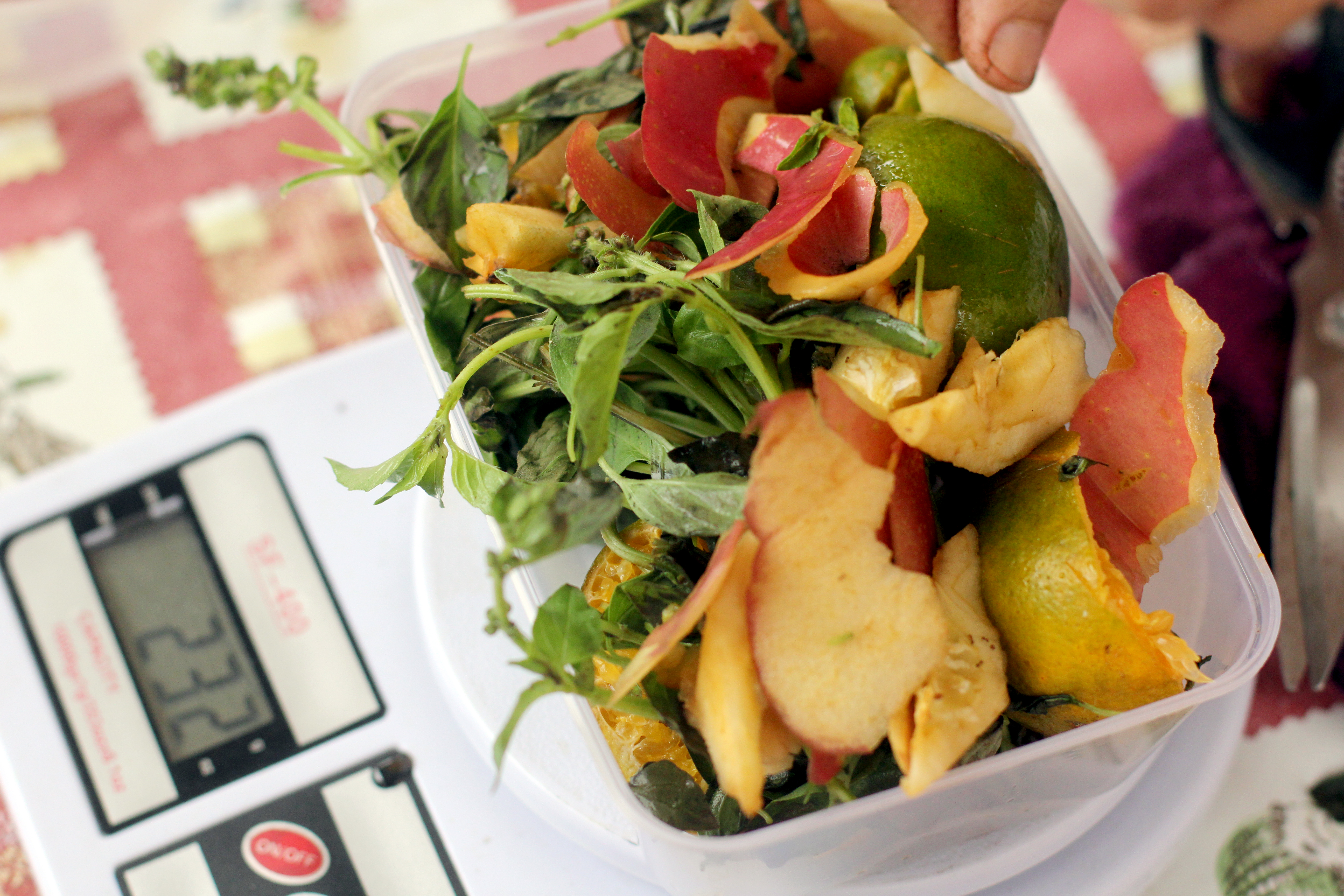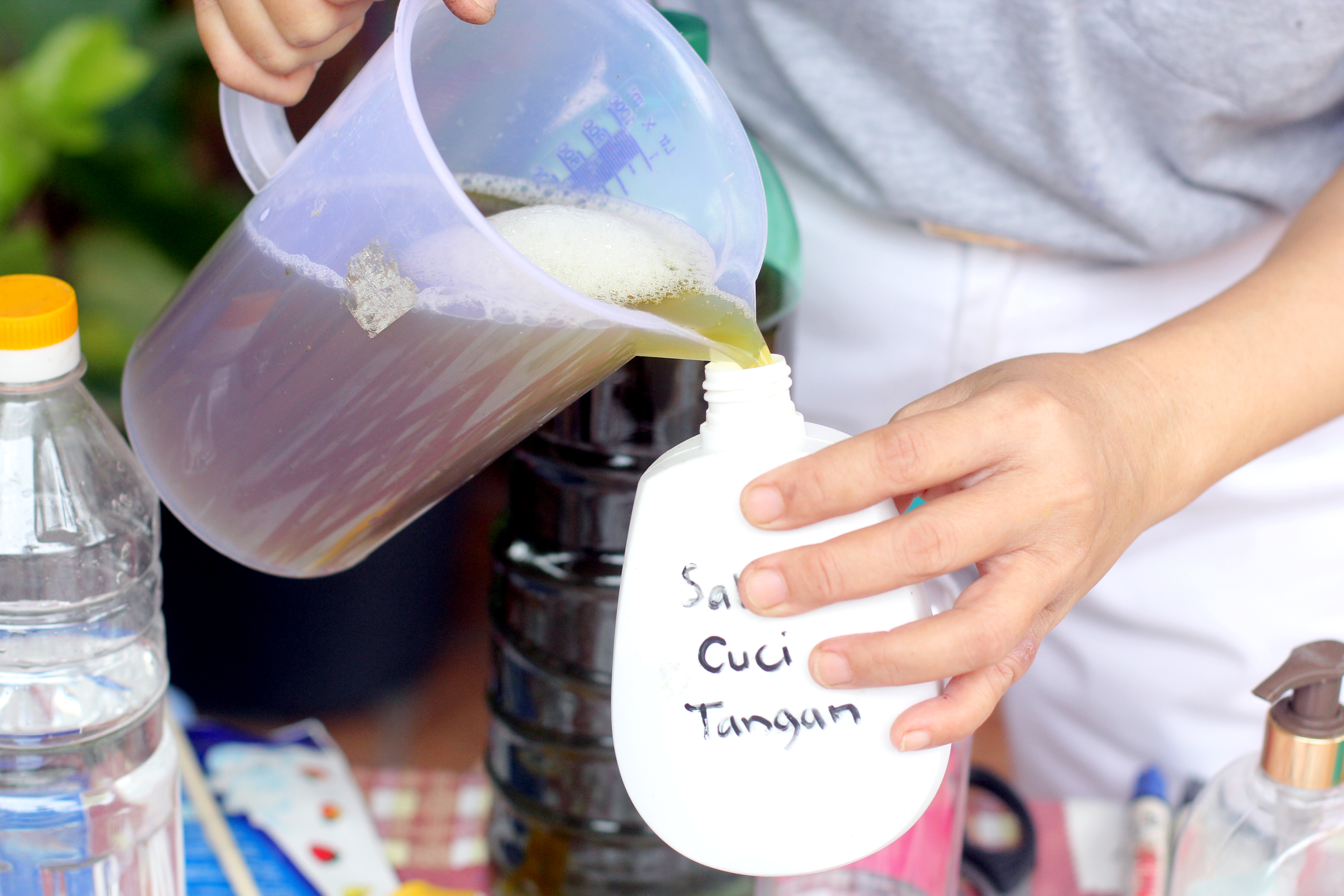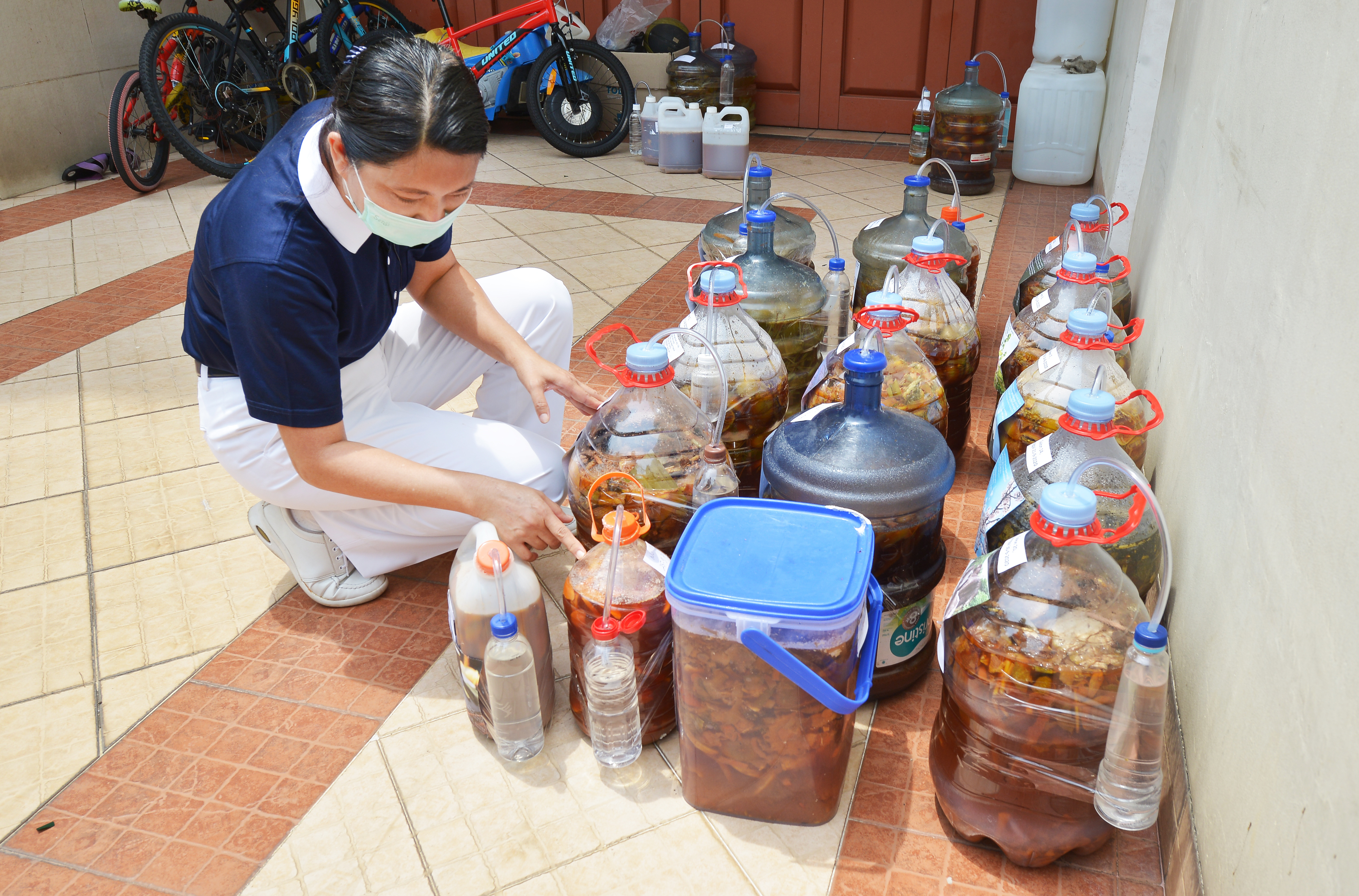Various benefits of Eco Enzyme

Johnny Chandrina, a volunteer of Tzu Chi Organization as well as a coordinator of the mission of Pelestarian Lingkungan Tzu Chi Indonesia, had verified that Eco enzyme is one of the liquids that can be produced from the fermentation of organic waste.
Some of the benefits of this product include floor cleaner liquid, plant fertilizers, dishwashing liquid and many more. The process of the fermentation of the product can be executed at home by using organic waste where most people need to stay home during the pandemic.
*****
In every household, people get rid of waste on a daily basis. Some of these unwanted things can be organic waste which may include unused parts of the vegetables and the skin of the fruits. This waste should be sorted and not thrown together with other waste. The organic waste can be processed into eco enzyme, a liquid which has a lot of benefits. During the process, eco enzymes are produced during the fermentation process of organic waste, mixed together with sugar and water. This technique was initially introduced by Dr. Rosukon Poompanvong, who is also the founder of Organic Agriculture in Thailand.
Volunteers of Tzu Chi are mostly acquainted with the existence of Eco enzymes. During the socialization of the mission of Pelestarian Lingkungan Tzu Chi Indonesia, other volunteers attended a session on the fermentation process of organic waste in making eco enzymes. There are also a number of volunteers who have already started making eco enzymes which eventually reduces the organic waste in their households.
“According to the data, organic waste has reached 55% of the total waste of every household. There is a need to reduce organic waste, provided 30-35% can be used to make eco enzymes”, said Johnny Chandrina, Functionary He Xin (coordinator) of mission of Pelestarian Lingkungan Tzu Chi Indonesia.
Furthermore, Johnny also mentioned that organic waste which is left out in nature can be dangerous to the earth. “When organic waste is thrown away, it can be washed with water and produce methane gas, which causes harm to the Earth. Therefore, it is advisable to utilize the organic waste to produce organic waste, instead of throwing them away,” said the volunteer who is aware of the benefits of the product since the year 2010.


The process in making Eco Enzymes can be easily made from organic waste in every household, which can be used for washing dishes. Juny Leong, another volunteer of Tzu Chi carried out this process and produced eco enzymes from organic waste by mixing water and brown sugar in containers.
Due to the various benefits of the eco enzymes, Johnny was willing to share his knowledge on the process of making eco enzymes to other volunteers. “They shared their experience with friends, who are residing in Jakarta, Medan, Pekanbaru and other branches of Tzu Chi. This encouraged them to apply the knowledge and they started making use of eco enzymes which have a lot of benefits in their daily lives,” Johnny explained.
According to Johnny, it will be an advantage if more people are willing to make eco enzymes because of the outstanding benefits. “Previously, it was known to be only used for floor cleaners and dishwashing liquids. However, now it can be also used for medical purposes, plant fertilizers, water purification, air freshener, detoxification and many more,” said the head of Tzu Chi Tangerang.
The existence of eco enzymes is definitely inline with the mission of thePelestarian Lingkungan Tzu Chi because of its main objective to save the earth and create an awareness to the environment. The process is easy because of the clear guidance of the proportion of organic waste that needs to be used. “As this is related to the mission of the pelestarian lingkungan, I hope that volunteers would show initiative to make use of the organic waste. Once we are aware of the process, this knowledge can be impart to others so that they can do the same,” said Johnny.
The process of organic waste

There are volunteers of Tzu Chi who have already been applying this knowledge, making use of the benefits and sharing their experiences. Juny Leong, one of the volunteers of the Tzu Chi community He Qi Utara 1, started to make this product while he was staying home as advised by the government since the covid-19 pandemic struck Indonesia.
In February 2020, he started making eco enzymes at home, and continued doing it for a year. “There have been times when it was a failure in the process of making eco enzymes. This may be due to the cover of the container which wasn’t tight enough or might be something else. It was indeed a happy moment when it was a success,” said Juny.
Juny makes use of eco enzymes for various things at home. “At home, it can be used for detoxification, floor cleaner liquid, dishwashing liquid and also used for plant fertilizers”. According to him, making eco enzymes is really easy, especially because there is a lot of information and simple ways that can be followed.

“The process in making Eco Enzymes does not require us to spend a lot of money to buy things. Organic waste can be placed in a used container and we just need to purchase some brown sugar to aid the process,” explained Juny.
It has been a year since Juny has been making eco enzymes for himself as well as sharing it with friends and other volunteers. “I make a lot not only for myself, but also share it with others. This not only reduces organic waste, but it is also beneficial in our daily lives,” said Juny.
Irawati, another volunteer of Tzu Chi Tangerang, shows enthusiasm towards the making of eco enzymes and started making this product in the year 2009. “Initially, I make use of fruit peels because of its good fragrance, which is only used for floor cleaners,” said Ira.
She is interested in making eco enzymes as it has a big impact on environmental conservation. “In making eco enzymes, we are able to reduce the waste and utilize its benefits which stops us from using chemicals,” said Ira. Since the past two years, she has been making use of eco enzymes and continues to make more as it has a lot of benefits.
The materials needed are easily available at home, from the market, and also from the neighbours staying in the same area. “Sometimes I would ask the pineapple seller to give me the waste from the skin of the fruits. I would also share them with my neighbours and keep the rest at home,” said the volunteer who has been doing this since the year 2007.

One of the benefits of eco enzymes is using it as a plant fertilizer that stimulates the growth of plants. Irawati makes use of eco enzymes as a plant fertilizer which promotes the roots and quality of leaves in plants.
Ira, who resides at Gading Serpong, Tangerang, has obtained 100 litres of eco enzymes which are in the process of fermentation. She makes it at different times by placing it in a used gallon and bucket. “I didn’t do it all at once, instead I kept a gap so that they give better results,” she explained.
Ira has been doing this on a daily basis as she uses them regularly. “The main objective is to reduce the waste, which has a lot of benefits. A simple example is to use as plant fertilizers, and the pulp can be used as fertilizers for bigger plants,” said Ira
Ira also feels happy that eco enzymes can be used and has a lot of benefits which were known long before. “Personally, it is so efficient in using this product in my daily routine and I am happy to share, even after trying for a number of times. During the floods, there were lots of cockroaches but it was cleared after using the eco enzymes,” said Ira.
Realizing the various benefits, Ira also shares her experiences with her neighbours who have applied this knowledge in making use of eco enzymes at home, especially during their free time since the covid-19 pandemic struck Indonesia.
Experiencing the benefits of eco enzyme
Five years ago, Irawati showed the process of making eco enzymes to Sundari Halim (51), also addressed as Loan. This was carried out in her housing area at Gading Serpong, Tangerang where the knowledge was shared to loan and the other ladies staying in that area. However, it was not applied due to the lack of time.


Tzu Chi volunteers pours the liquid of eco enzyme into the lake in the area of Tzu Chi Hospital. This aims to improve the water quality, provided it is poured proportionally to the volume at a given time.
Although Loan wasn’t ready to start making this product, Irawati shared her two small bottles of the eco enzyme and asked her to try. “Initially I was doubtful because I have never used it,” said Loan. This created a doubt as organic waste is one of the materials that is used and the husband also stopped her from doing this.
Eventually, Loan tried using this liquid to clean the floor. “I have a pet and my helper mops the floor regularly. Although she mops the floor twice a day, the smell doesn’t go away. Therefore, I tried to mix the water with the eco enzymes without my husband’s knowledge. After that, cleaning the floor for once a day doesn’t leave a smell,” said Loan.
Since that time, she started to make eco enzymes after knowing the benefits. During the pandemic in November 2020, she makes use of her time at home in making eco enzymes from the organic waste.
Then in February 2021, Loan started to ferment the liquid of eco enzyme. “The results are good although in the beginning, I would feel the smell of the organic waste, and kept it outside the house. To my surprise, after sometime I realized that it wasn’t smelly but instead it gave off a good scent, so I just kept it inside the house,” said Loan.
Other than cleaning the floor, Loan also uses eco enzymes to get rid of the oil stains in the kitchen. As a family, they continue to use eco enzymes which is a product of organic waste. “A family should support one other when they realize the benefits,” said Loan
Author: Arimami Suryo A.
Photographer: Dok. Tzu Chi Indonesia
Translator: Mely Kartono (Tzu Chi School)








 Sitemap
Sitemap